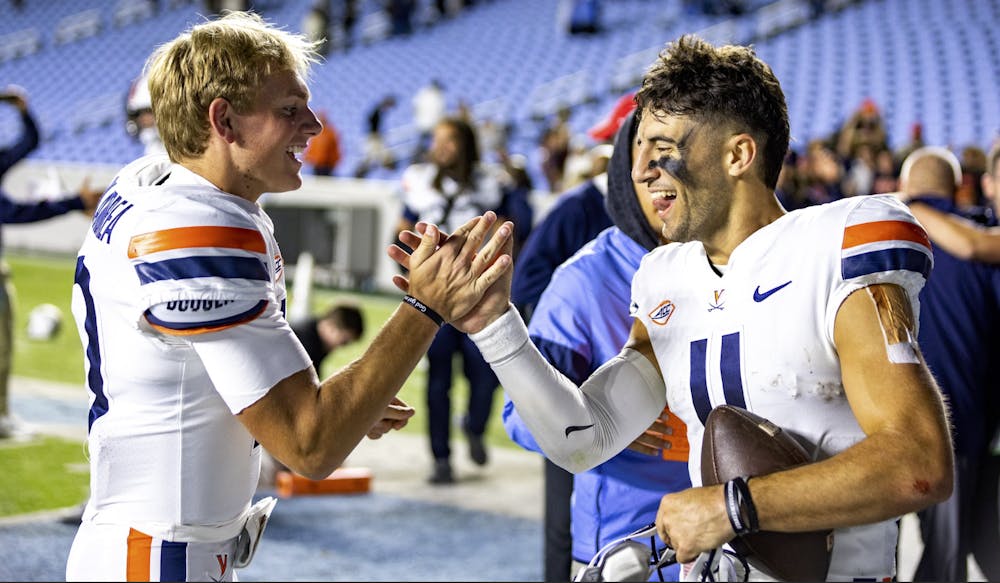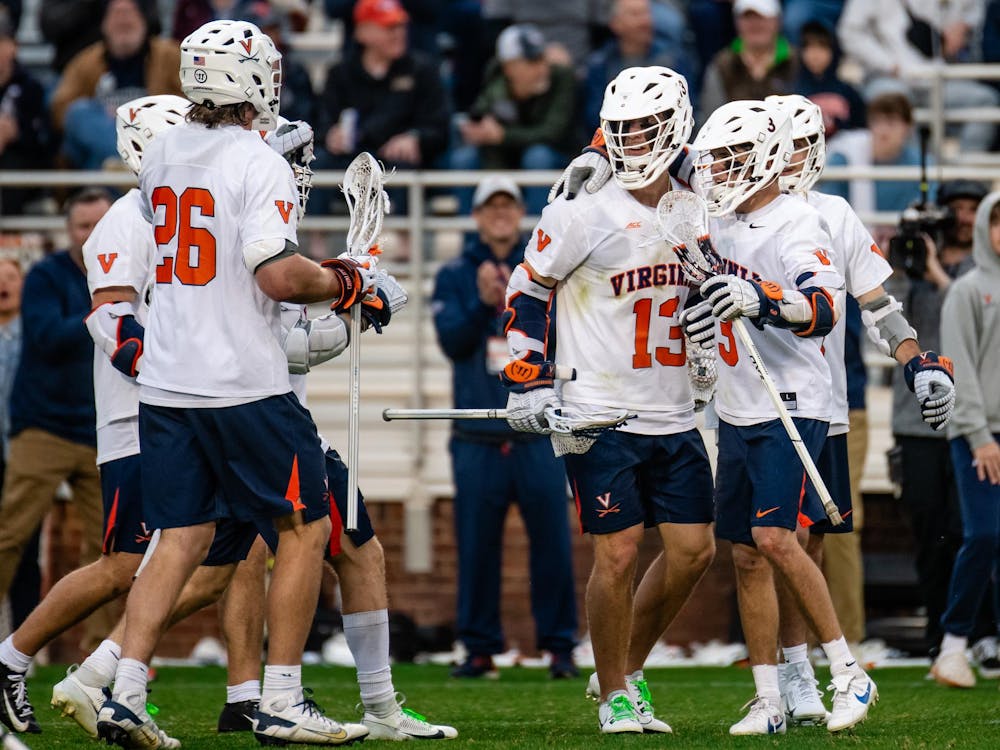Summer practices will soon begin for Virginia football, and it is still unknown which quarterback will start for the Cavaliers in the fall. Sophomore Anthony Colandrea and graduate student Tony Muskett split time for Virginia last season, and a compelling case can be made for either player moving forward.
The case for Colandrea
Colandrea is the fun option. His knack for creating huge plays was on display throughout a dynamic freshman campaign — he threw for 1,958 yards and 13 touchdowns across eight games of action, including six starts. Colandrea completed a decent 62.6 percent of his passes but also threw nine interceptions, however six of them came in just three games.
Ultimately, Coach Tony Elliott will start whichever quarterback he feels gives his team the best chance to win. But solely focusing on watchability, Colandrea was an injection of infectious energy both in play style and disposition for the Cavaliers last season. With Colandrea, the play is never dead, even when throwing the ball away may be the best course of action.
Colandrea dances during pregame, lowers his shoulder to run into players twice his size and plays with a brash recklessness. This leads to comparisons to other fiery undersized college quarterbacks who have had success, such as Heisman Trophy winners Johnny Manziel of Texas A&M and Baker Mayfield of Oklahoma.
His late-game sequence versus NC State is a microcosmic example of the Anthony Colandrea experience. Pushed back to the 18-yard line due to a penalty on a crucial two-point conversion attempt, Colandrea was flushed from the pocket, kept his eyes downfield and hurled the ball across his body into tight coverage where it was miraculously corralled by his receiver in the endzone. Colandrea removed his helmet, stood up and boldly flexed for a celebration. But an exuberant personality is often criminalized in football, and his antics drew a 15-yard penalty which directly aided NC State’s game-winning field goal drive.
That was just one of many teachable moments for the young freshman quarterback, and the case for Colandrea rests on him learning from reckless mistakes. The key is balancing a refinement of his boisterous style with letting Colandrea do what he does best — win the big plays.
Colandrea had an average target depth of 10.7 yards last season, which is significantly deeper than Muskett’s 7.4 yards. Colandrea’s ability to push the offense downfield is exemplified in his big-time throw rate of 6.9 percent — Muskett had 3.9 percent. However, that number walks a fine line between aggressive and reckless, and Colandrea’s play drifted over that line too often. He had a turnover-worthy play rate of 4.6 percent, much higher than Muskett’s mark of 2.8 percent. Ideally, Colandrea will maintain his aggressiveness while cutting down on turnovers.
From a personnel perspective, Colandrea might have the edge over Muskett based on fit with the other playmakers on offense. Wide receiver will likely be the team’s strongest position group since Virginia acquired some promising options in the portal. If the Cavaliers have another less-than-stellar rushing attack, as they did a season ago, they might need to lean more on their passing game. This would mean lighter personnel sets such as deploying three or more receivers on the field to maximize the talent at that position. This would bode well for Colandrea, who sported a slightly better passer rating of 83.5, yards per attempt of 7.2 and five more touchdowns than Muskett in these receiver-heavy sets.
The case for Muskett
The case for Muskett is simple — he is a consistent and proven commodity. He is also a strong leader for the offense and just does not quit. The Monmouth transfer who was injured in his first game with Virginia, Muskett’s season seemed dashed from the start. He then got himself healthy enough to play four weeks later, only to go down once again five weeks after that. He underwent reconstructive surgery on his shoulder in the offseason and appeared slated to be the team’s backup, but a strong spring has thrust Muskett right back into starting conversation.
Unlike Colandrea, there is nothing flashy about Muskett’s game. He is accurate throwing from a steady platform, is serviceable as a runner and takes care of the football. Muskett does not stretch the field like Colandrea, nor does he make as many ill-advised decisions. In the North Carolina game last season, he showed the ability to stay poised, keep the offense on schedule, and he ultimately helped topple the No. 10 team in the country.
Muskett was fantastic in the spring game, pushing the ball downfield and making plays off-schedule. This was encouraging to see after a season in which he struggled to stay composed when plays broke down. Muskett is even-keeled and an effective leader in his own right, making it hard to decipher which way the locker room sways.
Final Thoughts
This decision comes down to Elliott’s ideological view of the quarterback position. The choice is between trusting a quarterback who is experienced, dependable and consistent and gambling on a player with a more creative stroke and a hair-on-fire playstyle that can ignite an offense or reduce it to ash.
Elliott’s job security continues to dwindle after two consecutive losing seasons, and starting Muskett would raise the floor and help push the Cavaliers closer towards reaching the six-win benchmark. If Elliott does not lead Virginia to a bowl game appearance though, he could be out.
A crucial indictment against Muskett is that there is an argument for starting Colandrea because he has more years of eligibility and could be the quarterback of the future. If Colandrea is the backup instead of the top option, he may transfer. However, Elliott beat Virginia Tech, Duke and Boston College in pursuit of prized 2025 quarterback recruit Cole Geer. Muskett could start in 2024 and then Geer could take over, mitigating the loss of a Colandrea transfer and creating a smooth transition of power at the quarterback position.
The starting spot felt like Colandrea’s job to lose entering this offseason, and barring a disastrous summer, that should carry over into the season. A prolific season out of Colandrea does a great deal more for the program than one from Muskett when viewing the battle with a long-term perspective. Even if Colandrea struggles, Geer is on his way to compete in 2025. Starting Muskett just for one season and then watching Colandrea transfer without ever seeing his full potential could be a costly mistake though. Muskett should still have a chance to win the job, but a bumpier ride with Colandrea would pay dividends in the long run.
Elliott needs to win in 2024. This much is known. A back-and-forth approach of switching quarterbacks when one is struggling could be an option, but that risks the instability of an in-season positional battle for the heart of the team. Colandrea should be the frontrunner, but with Elliott’s job on the line, anything could happen. The Cavaliers must perform better and the quarterback situation will be the centerpiece of whatever unfolds in 2024.







